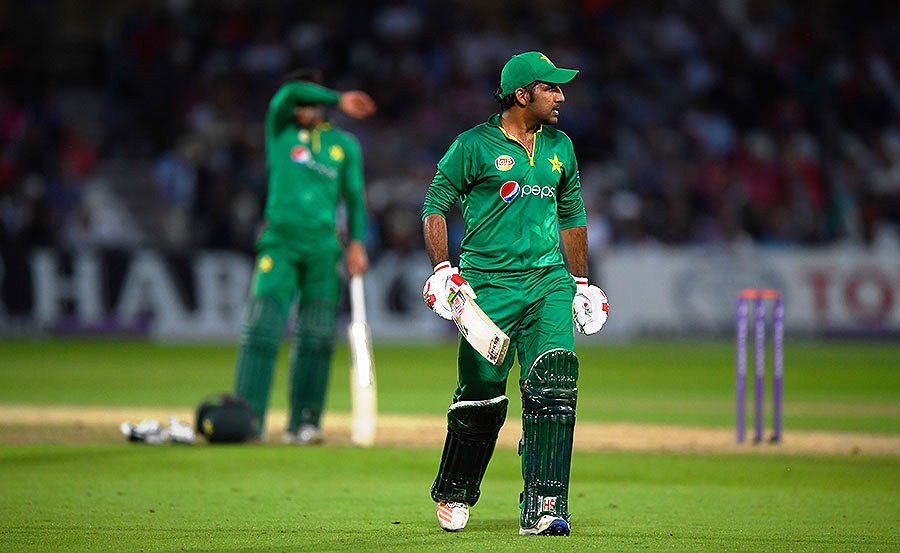
There is a dangerously fine line between success and failure in cricket, and harsh lady luck controls fate perhaps more than it does in any other sport.
The biggest problem in cricket is that whatever you do is judged on the outcome. A batsman comes down the track and tries to hit a spinner out of the track with his team at 30-3. Pull it off and he will be lauded for breaking the pressure, for taking the attack to the opposition. Fail, and he will be condemned as brainless.
Sarfraz taking right decisions as captain: Misbah
Similarly with the ball in hand, the exact same slower delivery can be both superb and foolish depending on the batsman at the other hand and whether he picks it or not.
Virender Sehwag simultaneously had both superb hand-eye coordination and poor cricketing technique depending on whether his cover drive went to the fence or the slip fielder.
In other sports, this line is not as blurred. Hit the ball towards the corner in hockey or football and you did your job well — regardless of whether the keeper saves it or not. Keep hitting the lines in tennis and you will have your opponent in trouble, again regardless of how well he responds.
In cricket, the end result determines whether the decision you made milliseconds ago was the right one or not.
This is where Pakistan’s new limited-overs skipper Sarfraz Ahmed must avoid his pitfall. For too long Pakistan has been calling out for an aggressive captain in the mould of Brendon McCullum or MS Dhoni.
In Sarfraz, no matter how successful or otherwise he proves to be, Pakistan have decidedly an improvement on his predecessors; his record as the T20I captain so far shows as much too.
The West Indies are a relatively accommodating opposition but times will not always be this easy and he will come up against teams that will be decidedly better than these West Indies and Pakistan sides.
Afridi, Younis unveil 2017 Champions Trophy at Edhi Centre
When he does, his decisions as captain may well decide the result of matches; and in the long run his own legacy. He will be better than Azhar Ali in the ODIs and Shahid Afridi in the T20Is but that is hardly a compliment; so poor the two were in their latter days as captain.
The question then remains how aggressive he can afford to be when Pakistan are the underdogs. He is no McCullum and expecting him to take the country on ‘one hell of a ride’ a la the Kiwi skipper in 2015 would be unfair.
It would be unfair not only because the Pakistan team is not the New Zealand team — completely giving in to the vision of their skipper — but also because the fans of the Pakistan cricket team are not the fans of the New Zealand cricket team; they will not tolerate failure. And since Sarfraz is burdened by the fear of defeat, he will never fly like McCullum did.
Nor can he be Dhoni; soaking up the expectations of a billion fans and the nerves of 10 teammates like some superhuman sponge that defied all logic. He won’t be afforded the patience or the control the World Cup winning glovesman did either.
2nd T20I: Pakistan bag three-run win over Windies
Instead, he must somehow find a blend of controlled aggression suited to his own team’s needs. He is now expected to make Pakistan both entertaining and successful; with a set of players that often struggle to be either, let alone both.
Sarfraz finds himself in a position where he will be judged not by his ability to motivate the side or groom young players or play aggressive cricket but, for better or for worse, by the results column alone. On top of that, the way he needs to play his cricket has already virtually been dictated to him by the nature of today’s cricket and the expectation of the fans. Failure, on either count, is not an option. No pressure.


1716998435-0/Ryan-Reynolds-Hugh-Jackman-(3)1716998435-0-165x106.webp)


1730808306-0/cover_1730807055FotoJet-(18)1730808306-0-270x192.webp)
1730802981-0/Untitled-design-(53)1730802981-0-270x192.webp)
1730803416-0/cover_1730793923FotoJet-(14)1730803416-0-270x192.webp)
1730803662-0/cover_1730784045FotoJet-(9)1730803662-0-270x192.webp)
1730787965-0/£300,000-(2)1730787965-0.png)
1730798219-0/Copy-of-Untitled-(4)1730798219-0-270x192.webp)




1730706072-0/Copy-of-Untitled-(2)1730706072-0-270x192.webp)
COMMENTS (1)
Comments are moderated and generally will be posted if they are on-topic and not abusive.
For more information, please see our Comments FAQ